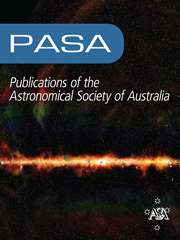Article contents
Beyond the Galaxy Luminosity Function
Published online by Cambridge University Press: 05 March 2013
Abstract
With the advent of large-scale surveys (i.e. Legacy Surveys) it is now possible to start looking beyond the galaxy luminosity function (LF) to more detailed statistical representations of the galaxy population, i.e multivariate distributions. In this review I first summarise the current state-of-play of the B-band global and cluster LFs and then briefly present two promising bivariate distributions: the luminosity–surface brightness plane (LSP) and the colour–luminosity plane (CLP). In both planes galaxy bulges and galaxy disks form marginally overlapping but distinct distributions, indicating two key formation/evolutionary processes (presumably merger and accretion). Forward progress in this subject now requires the routine application of reliable bulge–disk decomposition codes to allow independent investigation of these two key components.
Keywords
Information
- Type
- Research Article
- Information
- Copyright
- Copyright © Astronomical Society of Australia 2004
References
- 7
- Cited by

